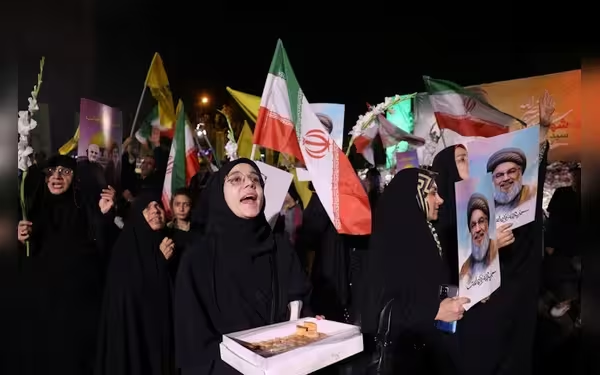Thursday, November 7, 2024 10:13 AM
Iran Missile Strikes Spark Celebrations in Beirut, Gaza, and Tehran
- Iran's missile strikes on Israel trigger widespread celebrations.
- Tehran witnesses massive crowds chanting in support of military actions.
- Beirut and Gaza echo Tehran's jubilation against Israeli policies.
 Image Credits: tribune.com.pk
Image Credits: tribune.com.pkIran's missile strikes on Israel lead to celebrations in Beirut, Gaza, and Tehran, reflecting regional tensions and support for military actions.
In a dramatic turn of events, Iran's recent ballistic missile strikes on Israel have ignited celebrations across various cities in the Middle East, particularly in Beirut, Gaza, and Tehran. This escalation in military action has not only heightened tensions in the region but has also sparked a wave of jubilation among supporters of Iran's stance against Israel. The strikes are seen by many as a show of strength and defiance, marking a significant moment in the ongoing conflict.
In Tehran, the atmosphere was electric as citizens took to the streets to express their joy. People poured out of their homes, filling the streets and highways, chanting "Allahu Akbar" in unison. This phrase, which translates to "God is the Greatest," has become a rallying cry for many in the region, symbolizing their support for Iran's actions. The celebrations were not limited to Tehran; similar scenes unfolded in other Iranian cities, where large crowds gathered to celebrate what they perceive as a victory for their nation.
In Beirut and Gaza, the response mirrored that of Tehran. Crowds gathered in public spaces, waving flags and chanting slogans in support of Iran's military actions. The strikes have been interpreted by many as a bold statement against Israel, and the celebrations reflect a deep-seated sentiment of solidarity among those who oppose Israeli policies in the region.
However, while the celebrations may seem jubilant, it is essential to recognize the broader implications of such military actions. The strikes have the potential to escalate tensions further, leading to a cycle of retaliation that could have dire consequences for civilians on both sides. The situation remains fluid, and the international community is closely monitoring developments.
The celebrations in Beirut, Gaza, and Tehran following Iran's missile strikes on Israel highlight the complex and often volatile nature of Middle Eastern politics. While many view these actions as a source of pride and a demonstration of strength, it is crucial to consider the potential ramifications for peace and stability in the region. As the situation unfolds, it serves as a reminder of the delicate balance that exists in international relations and the need for dialogue and understanding to prevent further conflict.













